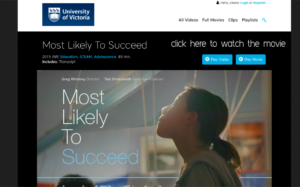This week in EDCI 336, we discussed a documentary film that we watched before class called Most Likely to Succeed (directed by Greg Whiteley). I personally enjoy documentaries, especially Micheal Moore’s films, so I was excited to give this one a watch. The film explores the history of education in the United States, states numerous modern failings of the system and touts one San Diego charter school called Tech High as the pedagogical solution to these issues.
After initial viewing, I would say my feelings on the film are quite mixed. I felt like the overall tone was quite sad, if not depressing. I was not able to sit down and watch this in one sitting, because I found that it actually significantly affected my mood. Ultimately, it didn’t leave me with the sense that I could actually do anything to help work towards righting the injustices explored in the film.
I also didn’t agree with several claims made by the film. For example, it was mentioned that many careers are being replaced by computers, including lawyers. I am very skeptical that our society is going to lose its need for qualified lawyers to argue legal issues in court. I think statements “computers are going to completely replace lawyers” were made to fear monger and create a strong case for the need for pedagogy like that of Tech High’s. However, the narrative they constructed is overly simplistic in my opinion.
From a personal perspective, I found the lack of job security for teachers at Tech High highly concerning. The fact that they only get a one year contract is abysmal.
One comment that really caught my attention was a blond mother who said: “I want my son to learn in school so that he does well on the SAT, so that he gets into a good college.” Overall, the issues in education outlined by this film are hard for teachers alone to solve. I think that the best solution would be free post-secondary education. If post-secondary schooling was free, there would be no (or at least less emphasis placed upon) “good schools”. Therefore, students wouldn’t go through their high school career with the sole goal of “acing the test”. In so doing, high school students would be able place more emphasis on exploring different subjects, discovering new passions, building critical thinking skills, working on self-development and expanding their ability to collaborate with others.
One of the take-home messages for me was this: education is messy. “It’s a complex human system, it’s about people.” Therefore, any attempts to standardize it are futile.
I could say a lot more about this film, but I think I will cap my thoughts here. If you are a UVic student or staff-member, feel free to watch the film for yourself here.

Photo by Annie Spratt from Unsplash.

Leave a Reply
You must be logged in to post a comment.